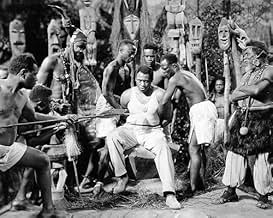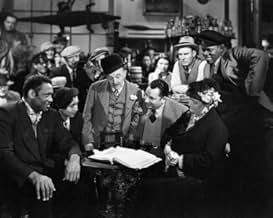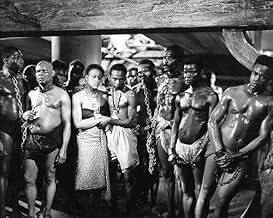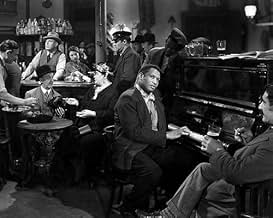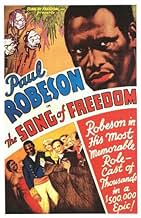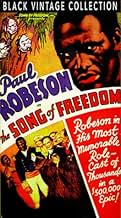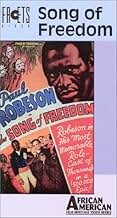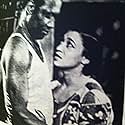A black British dockworker named Johnny Zinga becomes a famous singer and learns that he is the rightful king of the African island of Casanga.A black British dockworker named Johnny Zinga becomes a famous singer and learns that he is the rightful king of the African island of Casanga.A black British dockworker named Johnny Zinga becomes a famous singer and learns that he is the rightful king of the African island of Casanga.
Elisabeth Welch
- Ruth Zinga
- (as Elizabeth Welch)
Bernard Ansell
- Sir James Pyrie
- (as Bernerd Ansell)
Cornelia Smith
- Queen Zinga
- (as Miss C. Smith)
Sydney Benson
- Gate-Keeper
- (uncredited)
Cathleen Cavanagh
- Woman
- (uncredited)
Alf Goddard
- Alf, the Bartender
- (uncredited)
Featured reviews
10PWNYCNY
This movie is about how sheer chance and pure luck and can lead to fame and fortune. Paul Robeson is wonderful. His singing is comparable to that in the 1936 Show Boat, arguably the greatest musical ever made by Hollywood. Paul Robeson is such a commanding presence in this movie that without him this movie could not be made. Also the story is compelling as a man has a chance to fulfill his dream and in the process learn more about himself and his roots. Anyone who gives any thought to their own roots can relate to this movie. It's about a man's quest for cultural and spiritual fulfillment which this movie mots effectively portrays. Also impressive is Elizabeth Welch who plays Mr. Robeson's wife. A good story, well acted, excellent, inspirational songs, all combined to create a great movie.
This Hammer Studio, from London, England which is famous for its horror films surprised me with this great film from 1936 starring Paul Robeson, (John Zinga) who works as a London dock worker and sings songs all the time besides having a great bass voice for the opera and is discovered by a great opera director and producer from London, England. John is always wanting to go to Africa where he came from, but he does not know exactly where he was born, but he still remembers a song which he heard when he was very young. One day John happens to sing this song on stage in an opera performance and this song is recognized by an Englishman who tells him where it comes from and also a charm which John wears around his neck which helped determine its origin. John also has a wife and they both visit this Island and try to introduce themselves to these people and that is when the story gets very interesting. Don't miss this great film from the past, it is a gem in the rough. Enjoy
9tavm
In reviewing movies starring people of color in chronological order for Black History Month, we're now in 1936 when singer/actor Paul Robeson has one of his strongest roles yet on film. In this one, he's Johnny Zinga, a London dockworker whose constant singing during break time gets him the attention of impresario Gabriel Donozetti (Esme Percy) who offers him a chance to entertain in various concerts. He becomes successful but something pulls him back to his ancestral homeland in Africa and when someone confirms his heritage, he chucks his career to bring himself and his wife, Ruth (Elisabeth Welch) along with servant Monty (Robert Adams), there to claim his inherited royalty. But the native leader (James Solomon) there doubts him along with the rest of the tribe with the exception of Mandingo (Ecce Homo Toto). I'll stop there and just say this was dramatically satisfying from beginning to end and Robeson really carries the film on his own shoulders whether singing or reciting his lines. Ms. Welch herself has a nice singing voice as shown near the end. Some humor is also appreciated whenever Donozetti teaches some lessons to Johnny and since Monty is the same race as his superiors, his stereotypical antics is not as offensive as it would be with a Caucasian as his boss. So in summation, Song of Freedom is one of the most compelling films in Paul Robeson's career. P.S. One of his numbers is from the operatic version of "The Emperor Jones" as adopted musically by Louis Gruenberg. If you know about Mr. Robeson, you know his previous portrayal in the title role when it was originally a play and then later a movie.
Sure, the movie is dated in both technique and appearance. But it does have the great Paul Robeson in the central role as a dockworker and social equal of his white work mates. This is at a time when Blacks in American movies were reduced to either menials or buffoons. In terms of stereotypes, Robeson's non-demeaning role takes some getting used to. But try imagining that powerful presence and commanding voice in anything other than a dignified role. No wonder he was widely viewed as a threat to Jim Crow stereotypes.
Perhaps the film's most interesting aspect is what the Westernized Robeson can do for his benighted tribe of ancestors once he returns to them, uninvited. Sure, he can bring those sanitation and medical advances that will improve their collective health. The movie does a pretty good job of dramatizing that aspect, and we're all rooting for him to win out over the tribe's non-scientific methods and the witch- doctor power structure keeping them in place. But what happens after that. Of course, the movie stops at that point, so we don't know. But we do know another area of the continent has been opened to Western presence. The question then is whether Robeson will also bring in Western commercial interests, of much more dubious benefit than the proved health benefits, as history shows. After all, penicillin is one thing, Chevron is another. This remains a point to ponder now that the movie has set up the initial stage.
Despite its shortcomings (the outrageously fey Donizetti, for one), the movie remains an interesting artifact of its time, especially for Robeson's and other Blacks' acceptance into the white working class of London's docks. I'm sure the leftist Robeson found that labor- solidarity aspect particularly appealing. Then too, Elisabeth Welch delivers a fine natural performance as Robeson's loyal wife. We root for the two of them just as we would root for a courageous white couple. Above all, however, the film remains a chance to view one of America's noblest forgotten figuresthe great Paul Robeson.
Perhaps the film's most interesting aspect is what the Westernized Robeson can do for his benighted tribe of ancestors once he returns to them, uninvited. Sure, he can bring those sanitation and medical advances that will improve their collective health. The movie does a pretty good job of dramatizing that aspect, and we're all rooting for him to win out over the tribe's non-scientific methods and the witch- doctor power structure keeping them in place. But what happens after that. Of course, the movie stops at that point, so we don't know. But we do know another area of the continent has been opened to Western presence. The question then is whether Robeson will also bring in Western commercial interests, of much more dubious benefit than the proved health benefits, as history shows. After all, penicillin is one thing, Chevron is another. This remains a point to ponder now that the movie has set up the initial stage.
Despite its shortcomings (the outrageously fey Donizetti, for one), the movie remains an interesting artifact of its time, especially for Robeson's and other Blacks' acceptance into the white working class of London's docks. I'm sure the leftist Robeson found that labor- solidarity aspect particularly appealing. Then too, Elisabeth Welch delivers a fine natural performance as Robeson's loyal wife. We root for the two of them just as we would root for a courageous white couple. Above all, however, the film remains a chance to view one of America's noblest forgotten figuresthe great Paul Robeson.
It's sad that this sort of film simply could not have been made in Paul Robeson's home country at the time due to racism. Instead, Robeson went to the UK and made a few films--too few. I say this because he had a wonderful screen presence and his singing was gorgeous.
Robeson plays 'John Zinga'--a London dockworker descended from royalty back in Africa. Oddly, he lacks a British accent (while Robeson was a brilliant and multi-talented man, apparently a British accent was beyond him) and he has a weird sort of consciousness of his people and Africa within him. It goes far deeper than his interest in his cultural homeland--Robeson's character is fixated on the place and seems to have bits and pieces in the back of his mind about his homeland--though no one apparently ever told him about this--at least as far as he can remember. So, after becoming a huge singing star and learning more about the exact place in Africa where his forebears came from, he takes off for the place to get in touch with his roots.
The second portion of the film takes place an Zananga, Africa. There, Robeson is eventually recognized as a descendant of kings and brings culture, medicine and western civilization to these people--but it is a hard fight to get them to abandon their ineffective ways. It's nice that it's NOT a case of whites bringing this to these 'dark' people but a black man bringing this knowledge to them--making it seem a little less paternalistic. In many ways, this portion of the film seems like a call to other black men and women to return and contribute to their ancestral lands.
Overall, while the film might seem a bit old fashioned today, it really is a remarkable film in many ways. The most obvious is because of its unusual subject mater, but more important aspects should not be lost on the viewer. To have a mainstream film starring a strong and talented black man was very progressive for its day. And, seeing Robeson liked and respected by all as a person--even by his white co-workers. In many ways the film comes off as a bit overly ideal--absent is racism and in this film a good black man can achieve practically anything--a message that must have resonated in the black communities in the UK as well as back home in the States. A daring film and a great chance to see and hear an amazingly gifted man. For more on this, read his biography on IMDb--you'll see what I mean.
Robeson plays 'John Zinga'--a London dockworker descended from royalty back in Africa. Oddly, he lacks a British accent (while Robeson was a brilliant and multi-talented man, apparently a British accent was beyond him) and he has a weird sort of consciousness of his people and Africa within him. It goes far deeper than his interest in his cultural homeland--Robeson's character is fixated on the place and seems to have bits and pieces in the back of his mind about his homeland--though no one apparently ever told him about this--at least as far as he can remember. So, after becoming a huge singing star and learning more about the exact place in Africa where his forebears came from, he takes off for the place to get in touch with his roots.
The second portion of the film takes place an Zananga, Africa. There, Robeson is eventually recognized as a descendant of kings and brings culture, medicine and western civilization to these people--but it is a hard fight to get them to abandon their ineffective ways. It's nice that it's NOT a case of whites bringing this to these 'dark' people but a black man bringing this knowledge to them--making it seem a little less paternalistic. In many ways, this portion of the film seems like a call to other black men and women to return and contribute to their ancestral lands.
Overall, while the film might seem a bit old fashioned today, it really is a remarkable film in many ways. The most obvious is because of its unusual subject mater, but more important aspects should not be lost on the viewer. To have a mainstream film starring a strong and talented black man was very progressive for its day. And, seeing Robeson liked and respected by all as a person--even by his white co-workers. In many ways the film comes off as a bit overly ideal--absent is racism and in this film a good black man can achieve practically anything--a message that must have resonated in the black communities in the UK as well as back home in the States. A daring film and a great chance to see and hear an amazingly gifted man. For more on this, read his biography on IMDb--you'll see what I mean.
Did you know
- TriviaPaul Robeson performs a scene from Louis Gruenberg's operatic version of "The Emperor Jones". He earlier had starred in Eugene O'Neill's original play on Broadway (1923) and in the film version The Emperor Jones (1933).
- Quotes
Gabriel Donozetti: What's the matter the color of his skin, when he has color in his voice! Power! Beauty! I go fighting!
- ConnectionsFeatured in That's Black Entertainment (1990)
Details
- Release date
- Country of origin
- Languages
- Also known as
- Un trono por una canción
- Filming locations
- Production company
- See more company credits at IMDbPro
- Runtime
- 1h 20m(80 min)
- Color
- Aspect ratio
- 1.37 : 1
Contribute to this page
Suggest an edit or add missing content

